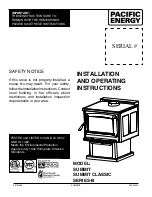
The Clean Air Act 1993 and Smoke Control Areas
SMOKE
EXEMPT
Under the Clean Air Act local authorities
may declare the whole or part of the
district of the authority to be a smoke
control area. It is an offence to emit
smoke from a chimney of a building,
from a furnace or from any fixed boiler if
located in a designated smoke control
area. It is also an offence to acquire an
"unauthorised fuel" for use within a
smoke control area unless it is used in
an "exempt" appliance ("exempted"
from the controls which generally apply
in the smoke control area).
In England appliances are exempted by
publication on a list by the Secretary of
State in accordance with changes made
to sections 20 and 21 of the Clean Air
Act 1993 by section 15 of the
Deregulation Act 2015. Similarly in
Scotland appliances are exempted by
publication on a list by Scottish
Ministers under section 50 of the
Regulatory Reform (Scotland) Act 2014.
In Northern Ireland appliances are
exempted by publication on a list by the
Department of Agriculture, Environment
and Rural Affairs under Section 16 of
the Environmental Better regulation Act
(Northern Ireland) 2016.
In Wales appliances are exempted by
regulations made by Welsh Ministers.
• Buxton II
(BUX2MF) has been
recommended as
suitable for use in
smoke control areas
when burning wood,
as such, when the secondary air
slider is in the closed position it
remains open by 14mm and the
tertiary air control should be fully
open and is prevented from closing
by a screw.
Further information on the requirements
of the Clean Air Act can be found here:
www.gov.uk/smoke-control-area-rules
Your local authority is responsible for
implementing the Clean Air Act 1993
including designation and supervision of
smoke control areas and you can
contact them for details of Clean Air Act
requirements.
CO Alarms
It is required by Building Regulations that
whenever a new or replacement
wood/solid fuel or biomass appliance is
installed in a dwelling a carbon monoxide
alarm to BS EN 50292:2002 must be fitted
in the same room as the appliance.
The alarm should be installed according
to the alarms manufacturers instructions
and should not be considered a substitute
for the appliance being installed correctly
and regular maintenance of the appliance
and flue system by a competent person.


































